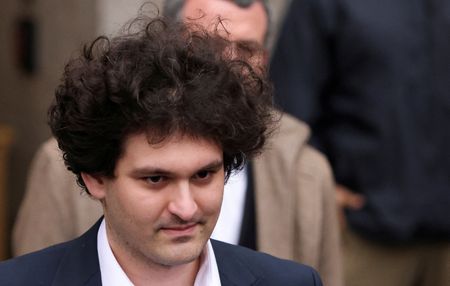By Luc Cohen and Jonathan Stempel
NEW YORK (Reuters) -FTX founder Sam Bankman-Fried has reached an agreement with U.S. prosecutors that would let him contact some current or former employees of cryptocurrency companies he once controlled, even as he accepts other restrictive bail conditions.
In a letter to the judge overseeing the former billionaire’s criminal fraud case, defense lawyer Mark Cohen said the terms more clearly define how Bankman-Fried can communicate with others as he prepares for his scheduled October trial.
Cohen also offered to withdraw a request that Bankman-Fried be able to access and transfer cryptocurrency, if U.S. District Judge Lewis Kaplan approves the agreement over communications.
Bankman-Fried, 30, has been free on $250 million bond and required to live with his parents in California since pleading not guilty to looting billions of dollars from the now-bankrupt FTX exchange.
Kaplan had last week temporarily barred Bankman-Fried from contacting employees of FTX and his hedge fund Alameda Research, or using apps such as Signal that let users auto-delete messages.
Those restrictions were added after prosecutors raised concern that Bankman-Fried might tamper with witnesses.
The proposed agreement would still bar Bankman-Fried from entering financial transactions over $1,000, except to pay his lawyers.
A spokesperson for U.S. Attorney Damian Williams in Manhattan did not immediately reply to a request for comment.
Cohen said prosecutors agreed to exempt some people from the no-contact order, without specifying names.
Bankman-Fried’s lawyers had proposed that he not be allowed to talk with select colleagues, including former Alameda chief Caroline Ellison, former FTX technology chief Zixiao “Gary” Wang and former FTX engineering chief Nishad Singh.
Ellison and Wang have pleaded guilty and are cooperating with prosecutors.
Last month, prosecutors first sounded the alarm about possible witness tampering.
They cited a Jan. 15 message that Bankman-Fried sent to the general counsel of the FTX U.S. affiliate, proposing that they speak on the phone to try to “have a constructive relationship” or “vet things with each other.”
Bankman-Fried’s lawyers countered that their client was simply trying to provide help.
Monday’s agreement would let Bankman-Fried communicate by phone and email, use WhatsApp if he installed monitoring technology and preserved his messages, and use Zoom, iMessage and Facebook messenger. He would remain unable to use Signal.
(Reporting by Luc Cohen and Jonathan Stempel in New York; Editing by Lisa Shumaker)

